The issue of the United States’ Country Of Origin Labeling (COOL) legislation seems like it might finally be coming to a head. In light of the most recent World Trade Organization (WTO) ruling, Canada is threatening retaliatory trade tariffs on US goods if they don’t comply and repeal the COOL legislation.
To recap: in 2009, the Canadian and Mexican governments launched complaints with the WTO that the COOL legislation causes unnecessary costs to the meat industry in Canada. This led to a series of appeals over the next six years by the US government that resulted in four WTO rulings in favour of the Canadian and Mexican governments. Their last appeal was met with the WTO’s final decision on May 18, 2015, which once again ruled against them.
“(If the US still refuses to comply), Canada will retaliate. We’ve announced the list of products that we will retaliate (with trade tariffs) and that got the attention of US legislators,” said Agriculture Minister Lyle Stewart. “Canada has already made an application to the WTO. The WTO has to approve each of the products. They dictate the level of retaliation that we can impose on each one in case the US doesn’t comply.”
According to Stewart, Canada will be ready to retaliate if it doesn’t see substantial progress by the end of summer. Fortunately, it seems as though a committee of the US House of Representatives has already approved a bill to repeal COOL and will soon go to Congress for debate.
“The debate will likely take place in June. It’s a very positive sign and for the US Congress, that’s warp speed,” said Stewart. “The bill would still have to be introduced and passed through the Senate. We’re not home free by a long stretch, but it’s a good sign.”
If the bill isn’t approved and the US continues to stall, this six-year-long trade dispute might finally devolve into a full-blown trade war. Considering the close relationship between the US and Canada, the effects could be devastating.
“None of us on either side want to see retaliation or the trade war that will ensue, but sadly with the longstanding trade relationship and friendship, we have to use the hammer every once in a while … it’s too bad, but we can’t let go of that hammer or we’ll be stuck with COOL forever,” said Stewart. “The trade relationship will be damaged to some extent, there’s no question, it’s already sustained some minor injuries from COOL. If we retaliate, they’re liable to ramp up on trade barriers as well.”
During the years this trade dispute has been ongoing, Canada’s industry has indicated estimated “damages in excess of $1 billion a year due to price declines, lost sales and added costs,” said a government news release. Saskatchewan in particular has the second largest cattle herd in the country with almost 2.9 million head. The province also markets around 2.1 million hogs a year.
“The reason for our complaint is because it causes problems, delays, and expense when farmers have to segregate all this product,” said Stewart. “If they want to label the product, that’s fine with us, but there’s no need for segregation in packing plants. That’s the part of the rules that causes the problem.”
Simply put, the COOL legislation mandates that in order to label a product, they have to be able to track it through its life cycle and production process. Since livestock are born on one side of the border and raised on the other, segregation is required to keep US livestock separate from Canadian livestock by the time they reach the packer house gate.
COOL proponents argue that consumers have a right to know where their meat is coming from while opponents argue that it’s unnecessary and discriminatory considering Canada and US have similar health protocols. Moreover, since Canada and US have been trading livestock for so long, cattle and livestock on both sides of the border are practically interrelated.
“Product can’t even be stored or assembled together in the case of live animals. That’s part of the problem,” said Stewart. “We don’t believe there should be any need for any separate packaging or labeling.”
The main proponents of the COOL legislation seem to be an organization of cattle producers in Montana by the name of R-Calf USA. While Stewart believes their support of COOL is to give US livestock a competitive advantage, CEO of R-Calf Bill Bullard disagrees.
“We believe that COOL is absolutely necessary in order for genuine competition to occur in the market,” Bullard said. “Only if consumers can differentiate between US and (foreign) products can they exercise choice and send demand signals upstream to the supply chain.”
Bullard believes that repealing COOL would be depriving Americans of the ability to choose between Canadian, Mexican, and American product if there aren’t labels. That said, in order to affix an accurate origin label to the final beef product, that product has to be traceable through its life cycle and production process.
He says that since packers already segregate products for a variety of reasons, this shouldn’t be a burdensome cost.
“That is true with a USA product as it is with a produce of mixed origin,” he said. “Everything is tracked where it was born and where it was slaughtered. We don’t believe that any discrimination occurs with the segregation process.”
Should the legislation be repealed, Bullard says they’ll have to “start from square one and rebuild as quickly as possible.” Their domestic producers cannot compete and will lose a huge amount of independence and freedom in the marketplace.




